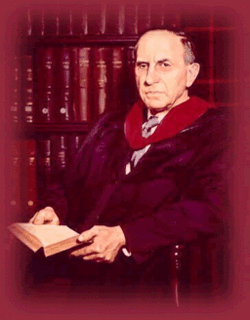
Is there ever a time or an occasion when we should lie? What about when your girlfriend asks you if you think she is fat? What about during World War 2, when some people were hiding Jews from the Nazis in their house?
Below are some points for reflection from John Murray's "Sanctity of Truth"
The entire article can be found at : http://www.the-highway.com/truth_Murray.html
1. The Foundation of the "Sanctity of Truth" is that God is Truth
"We are thus getting to the basis and heart of the question of ‘truth’. God is ‘the truth’, truth absolute, ultimate, eternal, in contradistinction from all that is relative, derived, partial, and temporal."
"When we speak, therefore, of the sanctity of truth, we must recognize that what underlies this concept is the sanctity of the being of God as the living and true God. He is the God of truth and all truth derives its sanctity from him. This is why all untruth or falsehood is wrong; it is a contradiction of that which God is. And this is why God cannot lie (Titus 1:2; Hebrews 6:18; cf Romans 3:4).’
2 A Christian Practices Truthfulness
"As untruth is the hallmark of impiety, so truth is the insigne of godliness. This is true, first of all, in respect of knowledge. No words of Scripture are more relevant than those of our Lord himself. ‘This is life eternal, that they might know thee the only true God and Jesus Christ whom thou hast sent’ (John 17:3). ‘I am the way, the truth, and the life: no one cometh unto the Father but by me’ (John 14:6). ‘If ye continue in my word, then are ye truly my disciples; and ye shall know the truth, and the truth shall make you free’ (John 8:31, 32). To know God is to know the truth; to be established in the faith and obedience of Christ is to know the truth. To know the Holy Spirit and to be indwelt by him is to be guided into all truth; the Spirit is ‘the Spirit of truth’ (John 16:13). "
3. There's a Difference between Truthfulness, Falsehood, and Concealment
"It is quite true that the Scripture warrants concealment of truth from those who have no claim upon it. We immediately recognize the justice of this. How intolerable life would be if we were under obligation to disclose all the truth. And concealment is often an obligation which truth itself requires. ‘He that goeth about as a talebearer revealeth secrets; but he that is of a faithful spirit concealeth a matter’ (Proverbs 11:13). It is also true that men often forfeit their right to know the truth and we are under no obligation to convey it to them."
"But these facts of the right and duty of concealment and of forfeiture of certain rights are not to be equated with our right to speak untruth. Forfeiture of right to know the truth and the right of concealment in such cases do not mean that our obligation to speak truth is ever forfeited. There is a chasm of difference between the forfeiture of right to know the truth, which belongs to one man, and the right to speak untruth on the part of another. The latter is not an inference to be drawn from the former. Those who argue for the right to speak untruth on the basis that others have forfeited their right to know or be told the truth have committed an egregious logical error and have sought to justify a deviation from truthfulness which the Scripture does not support."
4. Love and Truth Are Not an Antithesis
"No claim is more basic or ultimate than that of truth. We cannot regard any other sanction as higher on the altar of which truth may be sacrificed. By what warrant may we plead, as many have done,14 that love is a higher end out of consideration for which untruth is sometimes justifiable and dutiful? Is life itself more sacred than truth? God is love (I John 4:8, 16). But God is truth also (cf John 1:5; John 1:9; 17:3; I John 5:20; John 14:6; I John 5:6). Love and truth do not conflict in him and his truth is never curtailed or prejudiced in maintaining and promoting the interests of his love. God so loved the world that he gave his only-begotten Son and sent him into this world of sin and misery and death. This was love. But nothing could be more significant than this that when the Son came and was embarking upon the climactic commitment of his mission he said: ‘For this end am I born and for this purpose am I come into the world, that I might bear witness to the truth’ (John 18:37)."
5. Summary
"Truthfulness in us is derived from, and is patterned after, ‘the truth’, and ‘no lie is of the truth’ (I John 2:21). It is because untruth is the contradiction of the nature of God that it is wrong.15 Truth and untruth are antithetical because God is truth. And this is the reason why truthfulness and untruth do not cohere."

No comments:
Post a Comment